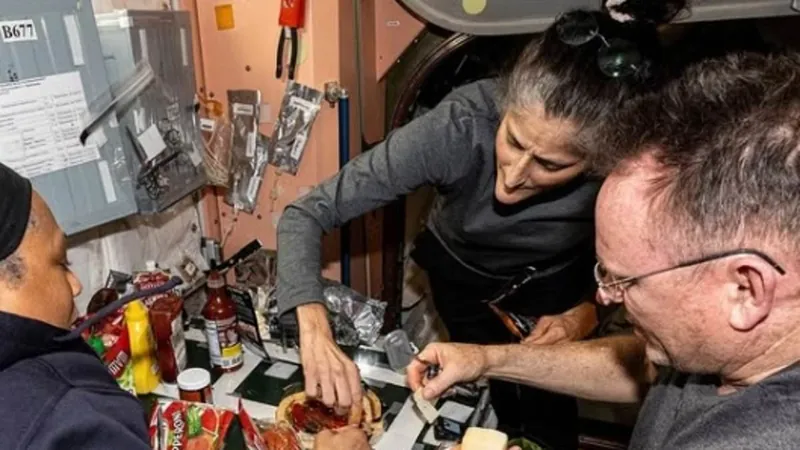
Alarming Health Warnings for NASA Astronauts Stuck on ISS as 'Gaunt' Photos Surface!
2024-11-05
Author: Jessica Wong
Concerns for Astronauts' Health on ISS
Recent images of NASA astronaut Sunita Williams have sparked fresh concerns about the health of crew members currently stranded on the International Space Station (ISS). Williams, 59, appears visibly "gaunt" in a recent photo, prompting a health expert to sound the alarm over her well-being.
Extended Mission Duration
Williams and her colleague Barry Wilmor were initially scheduled for an eight-day mission after they docked at the ISS on June 6. However, they have been orbiting Earth for a staggering 152 days due to issues with Boeing's Starliner spacecraft. While both astronauts have maintained a positive public image, Dr. Vinay Gupta, a seasoned pulmonologist from Seattle, suggests that the reality may be quite different.
Dr. Gupta's Concerns
In a statement, Dr. Gupta expressed concern, noting, “In that picture, you can see someone who is experiencing the stresses of prolonged living in a high-altitude environment, even inside a pressurized cabin.” He pointed out that visible signs such as sunken cheeks might indicate significant weight loss and a possible calorie deficit.
Metabolism Changes in Space
Space travel alters the body's metabolism, increasing calorie consumption due to the adjustments needed for maintaining body temperature and preventing muscle atrophy. Astronauts typically need to exercise for about 2.5 hours daily to counteract these effects, leading to a higher caloric burn.
Historical Precedent of Health Risks
The situation has become more alarming in light of a recent incident where an entire crew was hospitalized after an extended 200-day mission on the ISS, although the reasons for their hospitalization remain a mystery.
Diet and Nutrition Concerns
In the concerning photo from September 24, Williams was seen enjoying pepperoni pizza and chips, yet Dr. Gupta advised that indulging in high-calorie foods does not guarantee adequate nutritional intake. He further explained, “You can observe high-calorie foods being consumed, but it doesn’t imply a balanced diet, essential for maintaining health in such an extreme environment.”
Gender-Specific Health Risks
Another layer of complexity arises from gender-specific responses to spaceflight. A 2014 study by NASA revealed that women experience greater blood plasma loss than men during space travel, with distinct physiological responses that can elevate calorie burn and contribute to muscle loss. A 2023 study from Ball University echoed these concerns, indicating that women tend to lose muscle mass more rapidly than men in microgravity environments.
Conclusion: Risks of Long-Term Space Missions
Dr. Gupta elaborated, explaining how the reduced level of oxygen and limited nutritional intake exacerbate the challenges faced by astronauts, especially women. “The ability to work out is going to be limited,” he emphasized, which leads to suboptimal physiological conditions for maintaining health.
As experts continue to investigate the implications of long-term space missions on human health, the alarming images of Sunita Williams serve as a stark reminder of the inherent risks of space travel. With her safety now under scrutiny, followers of space exploration can only hope that she and her crewmates receive the support they need to ensure their health and well-being during this unprecedented situation. As the world watches, we can only wonder: What does the future hold for our brave astronauts stranded in the cosmos?




 Brasil (PT)
Brasil (PT)
 Canada (EN)
Canada (EN)
 Chile (ES)
Chile (ES)
 España (ES)
España (ES)
 France (FR)
France (FR)
 Hong Kong (EN)
Hong Kong (EN)
 Italia (IT)
Italia (IT)
 日本 (JA)
日本 (JA)
 Magyarország (HU)
Magyarország (HU)
 Norge (NO)
Norge (NO)
 Polska (PL)
Polska (PL)
 Schweiz (DE)
Schweiz (DE)
 Singapore (EN)
Singapore (EN)
 Sverige (SV)
Sverige (SV)
 Suomi (FI)
Suomi (FI)
 Türkiye (TR)
Türkiye (TR)